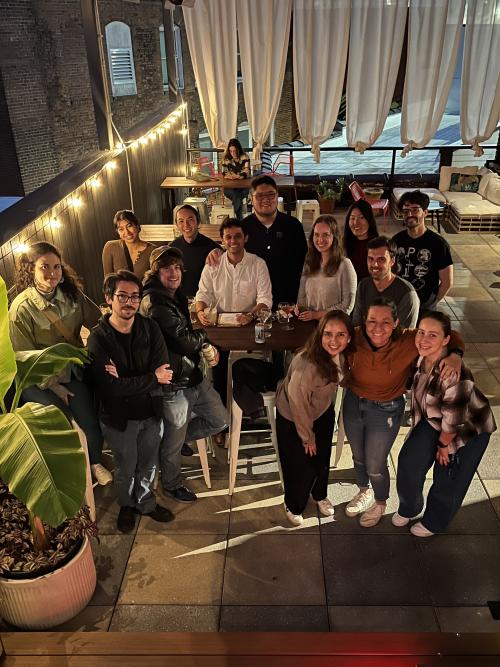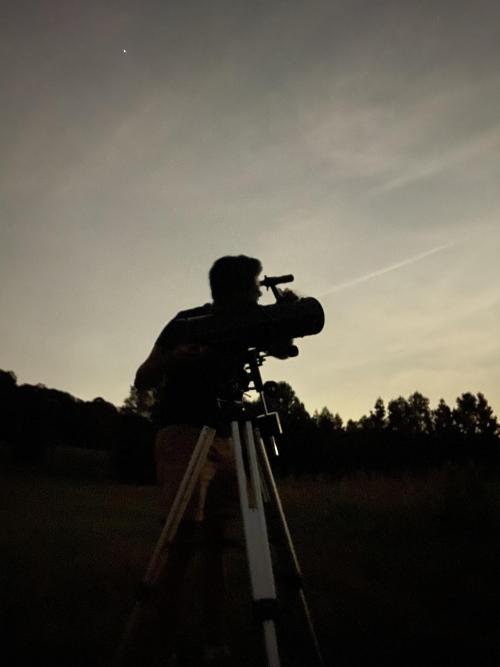Lucas Bellaiche
Lucas is a hot chocolate connoisseur and astronomy hobbyist who calls Arkansas and France home. As a PhD student in the LaBar lab, he studies the science of creativity and emotion.
Trainee Spotlight is a series of interviews from the Duke Institute for Brain Sciences that showcases the science and lives of the people behind the lab coats studying the brain at Duke. Want to suggest someone for the series or nominate yourself? Email DIBS's Director of Communications Dan Vahaba. Be sure to also explore a list of our spotlighted trainees' favorite spots around town here.
This interview has been edited for length and clarity.
How did you get started in science?
My dad is an academic. He does physics. Growing up, I was able to see such a unique career where he was doing what he loved. And at the same time, my mom was an artist, and she has her own gardening business now. He does the science and she does the art, and that's the household. I think it's cool that my research is based off of that, the science of art, creativity, and emotion. That's where the early interests sprouted.
In undergrad, I went to University of Arkansas and I was super lucky to find the Music Cognition Lab by Elizabeth Margulis. It turns out she was one of the biggest names in music cognition, and she was super kind. She let me join and do independent research early on. I was also a saxophone major, which is what originally drew me to the lab. I was interested in psychology, and that was exactly what I wanted to do— that bridging of arts and sciences. She moved to Princeton, so I joined another lab with Dr. Darya Zabelina, which was about creativity more broadly. From there, I'm lucky to go to Duke and keep pursuing that interdisciplinary route, working with different professors on these different aspects of creativity.
What do you study?
My research is broadly about the intersection of creativity and emotion. That includes work on aesthetics and music that started in undergrad. Right now, we're finishing up an analysis of an art therapy project with abstract painting here at Duke. That's seeing how emotion is involved in a creative process. At the same time, I'm also interested in how creativity is involved in emotion processing.
I just defended my master's thesis, which was this big theoretical paper about how creative thinking helps in day-to-day emotion regulation. If you're faced with a problem, how can you think creatively through that problem to deal with the negative emotion that it might bring up? I think there's a really rich relationship between the two, and that's where I'm residing right now.
How does your research impact people outside the lab?
I grew up hearing about art therapy. It's this popular buzz term that’s thrown around. It seems like a magic pill, and indeed, there are really cool clinical therapies. For people with Parkinson's, clinicians do a lot of dance therapies to help with the movement disorder aspect. With Alzheimer's, there's a lot of music therapy. But, as wide-reaching as it is, art therapy kind of lacks supporting psych and cognitive work that aims to understand the specific mechanisms of note, leading to unstandardized practices too.
We wanted to look at a very specific mode of art—abstract painting. And we wanted to expand it to people not necessarily diagnosed with any disorder, but your typical stressed-out Duke student, for example. In fact, the project was inspired by the Duke Wellness Center, which has some paint therapy sessions. Do those sessions work? Our work shows that yeah, it does. Even if you've never painted before, it seems like just doing a 20-minute session helps you in terms of anxiety, and that's what we're analyzing through right now. What Duke is doing through the Wellness Center works, and maybe other universities should pick that up. However, we also looked at whether the therapeutic effect permeates into the next day—if I paint today, will I feel better tomorrow? And the answer was no, actually. It might be that in order to maintain the therapeutic effects, you have to keep practicing the art. It's not just a magic pill. We're kind of reining in the power of art therapy to be more realistic.
What do you like about working in the LaBar lab?
We have such a community. Our lab hosts the Center for Cognitive Neuroscience’s weekly social hour about once a semester, and since ours is the LaBar Lab, we always come up with phenomenal pun themes. We’ve done LaBarbenheimer, LaBarnes & Noble, LaBarch Madness for basketball.
Outside of that, everyone is just great and super intelligent, and Kevin is a great mentor. He is very supportive in the research that I'm doing, in part, because he's also a musician—a classically trained pianist.
Any academic pro-tips to share?
Zotero is excellent. I was so stubborn against citation managers until I wrote my master's thesis, and Zotero solved basically everything in my life.
Where do you call home?
I was born and raised in Arkansas. Whenever I fly back home, it's so interesting. You can just tell who is from Arkansas if you're in the terminal, and on the plane, everyone's just talking to each other and helping with baggage. In contrast, if you fly to, like, New York, everyone's doing their own thing. That Arkansan community is unlike anything, so I really value that aspect of growing up there.
I was the first and only person in my entire family born in the States. My parents and their families are from Madagascar and France. I spent summers in Paris, where my family now lives. Bringing that mix of cultures to Arkansas was a very unique experience. So, there are a lot of places to call home.

What are some of your favorite places in the Triangle?
I really love Durham. It's very similar to the place I grew up in in Arkansas but a bit bigger. There's a lot of cool nature. It's more diverse than Arkansas, which I appreciate.
Durham has really good food, so I enjoy trying new restaurants and bars. The Velvet Hippo downtown is one of my favorites—it’s a rooftop bar. Mothers & Sons is also up there. I recently had food from a relatively new tapas place called Little Bull, which is really good. And Picnic is good barbecue. I’m not a barbecue snob even though I grew up in the South, but I would definitely say Picnic is my favorite I’ve had here.
What do you do for fun outside of the lab?
I'm a big film-TV person. I’m going to the movies twice this weekend! One for the new Scorsese film, another for a new Marvel movie. And I enjoy astronomy – I have my own telescope I lugged from Arkansas and will go out to fields with friends to stargaze.
I’m also involved in some intramural sports. I did intramural kickball through a community Durham league (2x champs!). We also have an intramural soccer team in the department, which is fun, too. We tend to play against people in other departments like the law school and the stats department.
Any other fun facts to share?
I love hot chocolate, and it's my goal to find the best on campus. On the whiteboard closest to my desk, I keep track of the places with the best hot chocolates. When Twinnie’s is good, it's phenomenal. But the Vondy [at Perkins] has reliably good hot chocolate on campus. It’s a fiery passion of mine.
